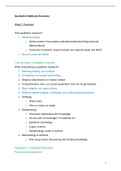Samenvatting
Qualitative Methods in Media and Comm. (CM2006) Summary
- Instelling
- Erasmus Universiteit Rotterdam (EUR)
A summary of the required readings, lecture notes, and tutorial notes from Qualitative Methods in Media and Comm. in Erasmus University Rotterdam with contents from all 8 weeks of the course.
[Meer zien]




